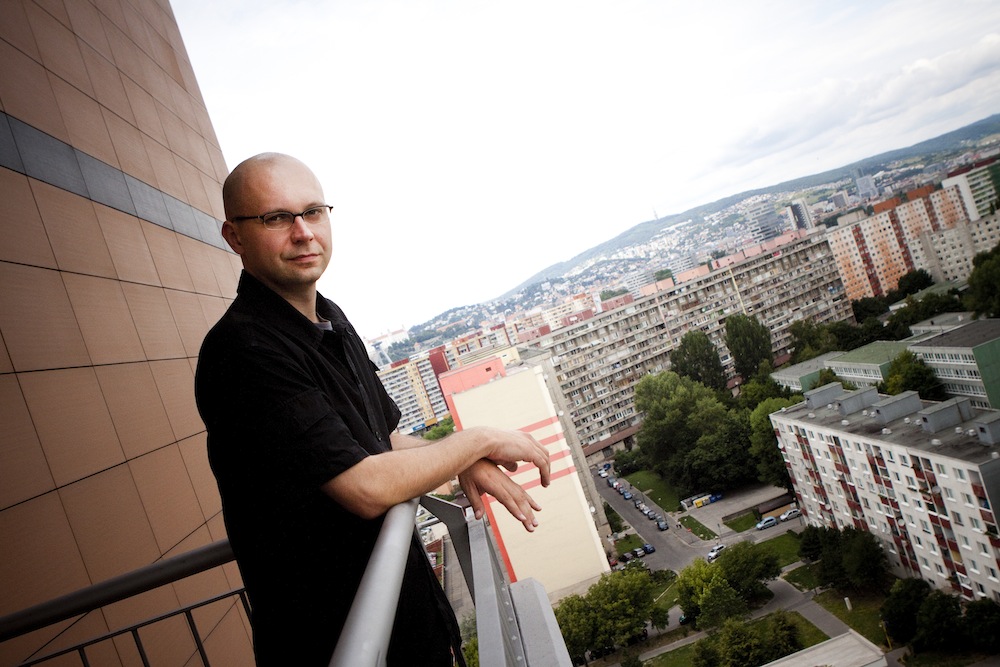Michal Tőzsér
A valuable crop since ancient time, hemp has been cultured with its seeds as food, and its fibres, strongest in the plant kingdom, for the production of rope, wagon cover, canvas, sailcloth and food.

Today, Michal Tőzsér leads a company that transacts wholesale business with hemp foods all over Europe. The hemp foods are imported from Canadian growers and producers who are pioneers in cultivating this plant solely for the needs of human consumption.
You do not conceal your ecological bearing, nor your slightly rebellious attitudes towards the current organization of society. You wear clothes with the Sea Shepherd logo that belongs to radical marine life conservationists. However, you studied economy at Matej Bel University in Banská Bystrica, management and marketing in particular, where traditional approaches are taught.Do you not think it contradictory?
I was also accepted to geology (laugh), but in the end I had chosen a program focused on small and medium enterprise. I considered it more practical and pragmatic to learn how to run a business. And even though I had not had any idea then that I would be a partner in my own business, such subjects as law, psychology, marketing, management and accounting came useful.
You were ecologically oriented while still at the university; were you interested in sustainable development then?
I had always felt like an extraterrestrial and looked at things from different angles. I realized the way our world was heading was unsustainable. What I have in mind is that ceaseless pursuit of eternal growth in the context of limited natural resources. I had always been aware of the unsustainability of this linear approach.
It seems as if you represented a minority opinion at the school then.
I had never confronted my opinions with my schoolmates. It was probably because I miss the exhibitionist part of my personality (laugh) and I do not feel the need to keep confirming my attitudes in confrontation. I prefer perceiving and observing things from different sides and I find out I see them otherwise than most people do.
When did you become interested in technical hemp?
As many other students, I came across psychoactive hemp aka marihuana at the halls, and I tried it. I understood this plant was interesting and I should dedicate it more attention. Of course, not only to the recreational one (laugh). I did some investigation and found out there were other hemp varieties besides marihuana that did not contain THC and psychoactive substances. I found out that technical hemp used to be grown at large here in Slovakia and it was a renewable natural resource par excellence that could help resolve many problems of current civilization.
What problems of current civilization could technical hemp resolve?
For example, it grows 4 meters high in 110 days even in a less fertile soil; it need not be chemically treated against pests. It is a modest ecological source of pulp, biomass, natural fiber and, in line with the latest trends, of high quality foods for humans as well as animals. Having in mind current problems with the sustainability of development, we have a plant here that can be virtually utilized up to 100 per cent. Hemp fibers are already mixed with plastics to get biodegradable plastic composites; hemp shives (inner woody part of the stalk) are added to concrete mixtures to build buildings with a negative carbon footprint.
How did your business start?
We had known from the beginning we wanted to do wholesale and we wanted to do the whole Europe given the volumes. We started buying goods from Hemp Oil Canada, the largest Canadian company processing hemp seed. Following our third order they themselves decided it was more expedient for them to supply Europe through one organization and our company Hemp Seed Oil Europe became Hemp Oil Canada’s authorized representative for Europe’s territory.
First we were buying hemp oil. Our top client was a Czech cosmetic company that used the exceptional properties of hemp oil in their hemp cosmetic product line. Then private label clients from all over Europe joined in, as well as first companies from Slovakia, Slovenia and the Czech Republic. The hemp oil is suitable for cold cuisine and beneficial for the human body. Currently we rank among the first four companies in Europe as far as sold volumes of hemp oil are concerned.
The range of hemp foods is diverse. Apart from oil, there are hulled seeds, energy bars and hemp protein powder on the market. Is there a shift in preference in time related to different foods?
Last year showed a growing interest in hemp protein on the side of customers. The hemp protein is ground from the seed cake left after the oil is pressed from hemp seed. The ground matter is then sifted to get a 50 per cent protein and a great amount of dietary fiber. The hemp protein is one of the few plant proteins that contains all the 22 known amino acids including the 8 essential amino acids. It contains a great amount of minerals and vitamins and can be absorbed up to 98 per cent as it is free of trypsin inhibitors. Furthermore, it is gluten free and free of any other known allergens. Currently it can be bought at dozens of organic food shops in Slovakia or on the internet. Moreover, the SUM trade mark managed to get in the transnational network of shops in Slovakia and the Czech Republic that sell cosmetics and household products, as well as organic quality foods and food supplements.
So you only market the organic quality hemp food?
Producers also supply conventional quality. It comes as a paradox, that conventional hemp foods fail to meet only one of about 10 conditions that food must comply with to be called organic. Particularly, it is the condition that a plant must be grown in a soil relieved of any supporting fertilizers, which takes ordinary farmers years to achieve. In any case, our customers representing private labels all over Europe are mostly interested in organic quality. This is the current consumer situation.
How do you estimate the developments in the hemp food business?
The market at the level of individual countries of continental Europe is similar. Hemp foods are sold mainly in specialized organic and natural shops. Exceptionally, they also appear on the counters in supermarkets. The demand is growing, nevertheless the hemp intended for seed processing is not grown at such an area that the producers would be able to saturate a possibly great demand of large supermarket networks.
The growth of European consumption is best seen with respect to hemp oil. When we were starting our business, we imported 10 thousand litres of hemp oil from Canada in 2010. In 2013, it was already 60 thousand litres. Hemp protein is only being discovered by private labels, but it also marks a rapid growth of interest on the side of consumers.
Why this growth in preference?
I believe it is not only my projection and I and my colleagues are not the only ones who believe that hemp is a plant of the third millennium. It satisfies all the conditions regarding sustainable development. It is very beneficial as food; it is a complex food due to what it contains. Hemp oil helps prevent neurodegenerative diseases and contains antioxidants. Hemp protein is suitable for active people, sports persons or pregnant women, it can feed the body completely. I think the demand will grow if awareness is well promoted.

Michal Tőzsér
Age: 36Occupation: marketing manager @ Hemp Seed Oil Europe Ltd.
Hobby: Skiing, Swimming, Paradigm Shifts, Holistic psychology
